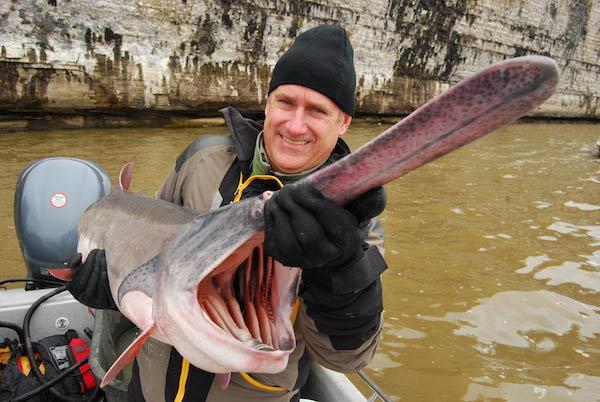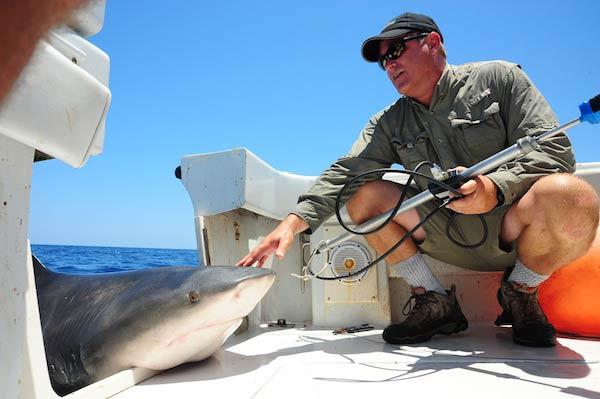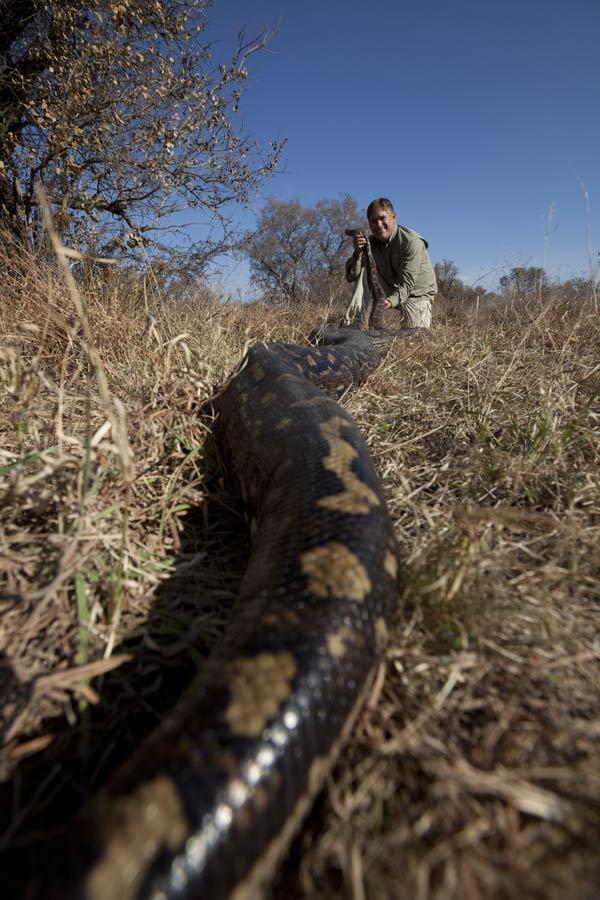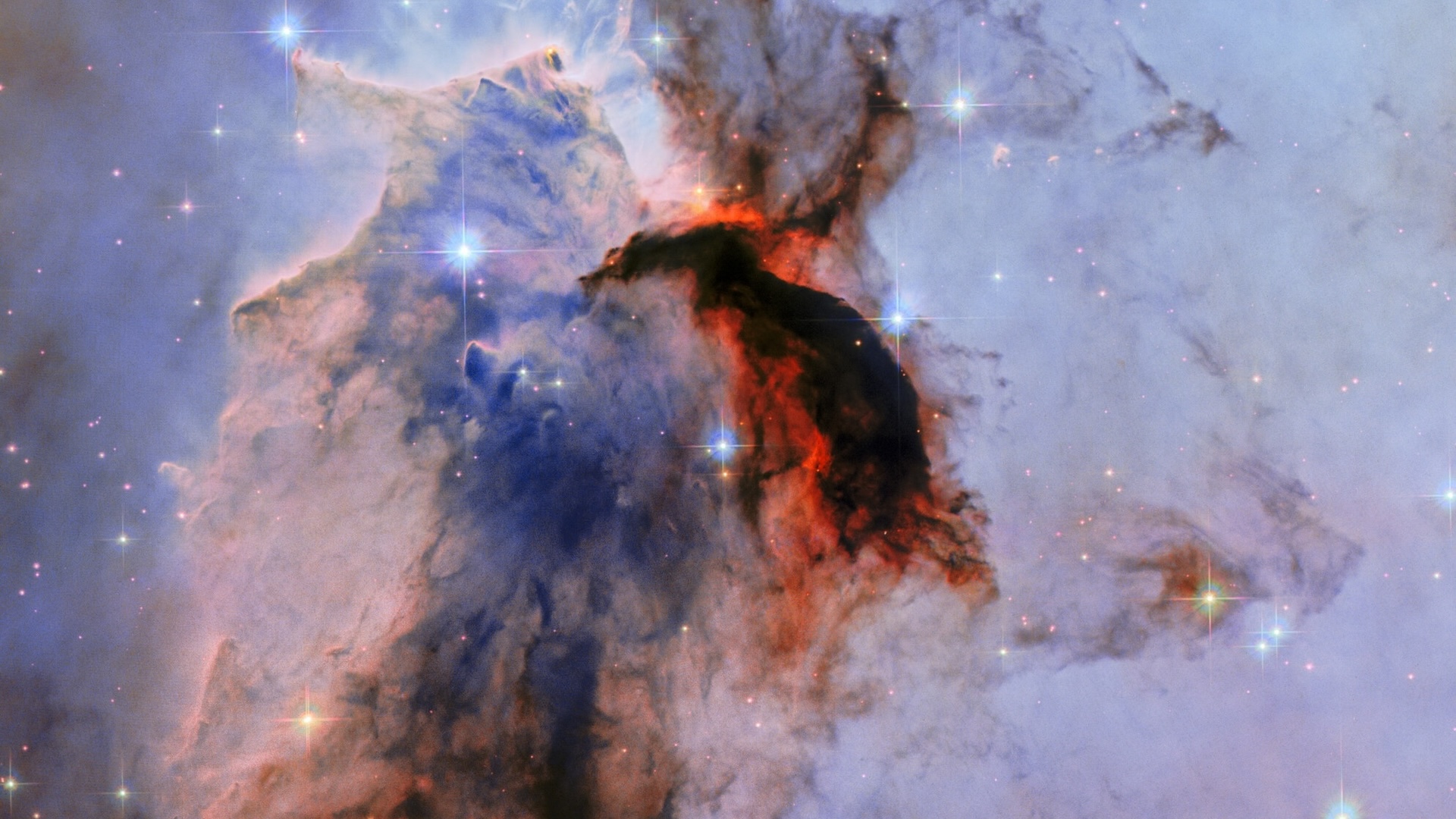
Not-so-Dangerous: Encounter with Nat Geo Host

Brady Barr, the host of "Dangerous Encounters" on the Nat Geo Wild channel, is easy to pick out at a hotel restaurant in Midtown Manhattan. Fresh from an appearance on "Good Morning America," the compact herpetologist (that's a reptile researcher), clad in blue jeans and a gray sweater, is a bundle of energy despite what must have been a painfully early wake-up call.
With mischievous blue eyes and an infectious grin, the 48-year-old educator, scientist, and television host of more than a decade looks unaffected by years of hair-raising adventures: He's gone face-to-face with great white sharks, wrestled crocodiles, licked giant salamanders and suffered the horrors of countless parasites (two words: brain worms).
It's an unlikely career path for an animal-crazy kid from southern Indiana. After years of teaching high school in his native state, Barr went back to school in Florida, where his life took an unexpected turn.
While finishing up a Ph.D. at the University of Miami, Barr's work pumping alligator stomachs he says he's given the Heimlich to more than 5,000 alligators caught the attention of a few film crews, among them National Geographic. That was 14 years ago, and Barr has been hosting shows for the institution ever since.
OurAmazingPlanet sat down with Barr to find out about some of his most dramatic on- and off-camera experiences, and learned which animal scares him most of all. It might surprise you.
OAP: Brady Barr, thanks so much for talking with us. How did you get into reptiles in the first place? When you were a kid, was there a particular moment when you realized you wanted to study them as a career?
Barr: I don't know if there was a specific point. I was always animal crazy. But I can remember the point when it was crocs. I'd just gotten to south Florida I went down there to study snakes and I went to the Everglades for one of the first times.
Sign up for the Live Science daily newsletter now
Get the world’s most fascinating discoveries delivered straight to your inbox.
I'm all by myself. I see a baby alligator I've never seen a croc or an alligator I quickly wade out and I grab it. So I've got this alligator in my hand, and I'm marveling at it, when I hear something coming through the brush that sounds like a freight train. It's the mom. Crocs are great parents they take care of their kids!
She comes rushing out, I run and jump in the back of the truck. I've got the baby, and she's hissing, snapping, rushing back and forth. So I hand down the baby. She picks it up in her mouth, and gently carries it back to the water, and they both swim away.
I said, 'Done.' I'm working on these guys. Here's an animal which we think has this pea-sized brain, is very primitive, and just a killing machine and that's so far from the truth. They're complex, very vocal, very social, very intelligent animals.
OAP: And after years of hosting programs on Nat Geo exclusively about reptiles, animals you've studied a great deal, was it a big transition when you started work on "Dangerous Encounters"? On that show you investigate a much wider range of creatures.
Barr: Absolutely. Look, if I had my way, every show would be a croc or a snake film. Crocs are my passion. I've caught every species. So that is my comfort zone. But you can only catch so many crocs and so many snakes.
And "Dangerous Encounters" has been really rewarding. In the last few years I've gotten to go places and see things I never dreamed of. What herpetologist gets to go out and put their hands on a polar bear and relocate it? Polar bears, grizzlies, lions, elephants: It's all fair game, and that's what keeps it interesting. And talk about dangerous! Because now I have to rely on the expertise of whomever I'm with to keep me safe.

OAP: Are there any animals you've encountered in your career that are particularly amazing to experience firsthand? Any creature that particularly stands out?
Barr: I've done a number of great white films, and every time you're in the water with one of those things ... I've never been around something so awe-inspiring.
There are a handful of animals and the great white is one of them it doesn't matter who you are, how much money you have, how powerful a position you may hold, you can only see those animals when they bless you with their presence. You can't go to a zoo, you can't go to an aquarium, because they don't exist there. You just have to wait on them. You have to be blessed.
OAP: Can you remember the first time you were in the water with a great white shark? What that was that like for you?
Barr: It's branded into my brain! I was horrified! We free dove no cage, no nothing. I was with this guy, a legend with great whites. He's about 6-foot-7, in a lime green wetsuit, with this big wooly red beard. He says, 'You'll be fine, just don't swim away. If you act scared, they're gonna eat you. Stick to me as long as you don't look like a seal, you're fine,' and he jumps in the water.
I look down, and I'm 5-foot-9, I'm in a black wet suit with silver fins, hell, I am a seal!
And I jumped in the water. How are you not afraid? With this huge thing the size of a city bus coming toward you! It was the most awe-inspiring thing I've ever done with animals. They'd get within 3 or 4 feet, and then bank around you. Your heart is just pounding. That was special.

OAP: Is there any animal out there that people might not realize is particularly frightening? Anything under the radar?
Barr: Hippos. My biggest fear. I'm more horrified of those things ... look, they are the second-largest land animal on the planet 3 tons they can run like the wind, and they have a bad attitude. That's been my monster. People think they're just big chubby, pig-like animals that are smiling and friendly. They are seriously dangerous.
OAP: One episode this season is all about hippos?
Barr: Capturing them is kind of the last frontier because they're semi-aquatic. This season I was working with experts on net gun technology. Hippos are scary dangerous. More people are killed by them than any of the other mega-fauna.
OAP: Speaking of danger, what's been the most dangerous part of your job over the years?
Barr: Honestly, it's the things you can't see. I have a parasitologist, and he loves it when I come in. He gets out his maps, he writes scientific papers I'm his prize patient. But the things I have picked up have made me an old man.
On two different occasions I've had this parasite, a small worm that gets into your brain. You just want to take a knife to your head to get rid of the pressure. I had to go through chemotherapy to get rid of these worms. (Laughs) It takes a brave man to tell a reporter he's had brain worms!
But those are the dangers that you don't hear about and you don't see malaria, and these tropical parasites you pick up. Both my producer and I were hospitalized with lung fungus that we picked up in a cave in Indonesia darn near killed us both.
OAP: It sounds as though it's unlikely this job will ever get boring.
Barr: That's what I tell people there's no on-camera and off-camera persona. What you see is what you get.
I'm not the most polished person in the world, but the excitement and enthusiasm is genuine. And if we went out and caught a croc today, I would be just as excited as I was 20 years ago. I've caught something like 10,000 crocs, but it's still just as exciting and rewarding and fascinating to me as it was the day I started.
A new season of "Dangerous Encounters" is now underway on Nat Geo Wild. Catch it on Tuesday nights. Barr says he's already dreaming up ideas for the show's next season alligator snapping turtles and walruses are just a couple of the creatures Barr says he'd like to encounter.
Reach Andrea Mustain at amustain@techmedianetwork.com. Follow her on Twitter @AndreaMustain.










